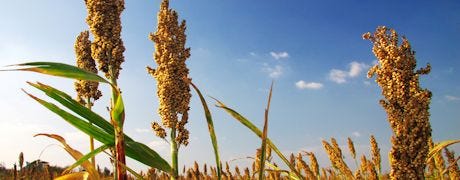
Scott Staggeborn likes to look on the bright side of any situation.
The former Kansas State University extension agronomist, now working in sorghum research with Chromatin, says the bright side of two consecutive years of drought in Kansas may be a resurgence of interest in his favorite crop.
"When we have years of pretty good rainfall everybody gets on board with planting corn because the money is so good in corn," he said. "You'll get people saying sorghum acres are down and interest in the crop is waning. Then you get years like the last two and suddenly everybody starts rethinking the value of drought tolerance."

Drought tolerance, plus lower crop input costs, are advantages that sorghum has over corn agronomically. It also has the advantage of being a corn substitute in livestock rations and in ethanol production.
Drought tolerance, plus lower crop input costs, are advantages that sorghum has over corn agronomically. It also has the advantage of being a corn substitute in livestock rations and in ethanol production.
A good substitute
"You can pretty much substitute sorghum for corn in an existing grain ethanol plant without modification," Staggenborn said. "And you can pretty much count on the DDGs being a one-for-one substitute in animal feed rations."
Sorghum has another advantage to cattlemen, ethanol producers and the feeding operations that use DDGs. It is not a favorite food of the insects that damage corn ears and set up the pathway for Aspergillus mold and its byproduct, aflatoxin.
"A feedlot that is buying sorghum or an ethanol plant that is using it for feedstock doesn't have to worry about testing for aflatoxin," Staggenborn said. "And producers don't have to worry that their harvest will be rejected at the elevator."
Sorghum also comes more than one variety.
There are forage varieties that can be grown for cellulosic ethanol production, high-residue cover crops or livestock feed and human food varieties produced for a white grain, anti-oxidant flour that is a gluten-free substitute for wheat flour to make cakes, cookies and bread.
"It's just such a versatile crop that we really expect to see farmers taking another look at where it fits into their rotation," he said.
Sorghum is about $100 an acre less expensive to grow than corn, based on input costs, he said. That means in high-risk years, it only makes sense for farmers to take another look at the crop."
Be sure to watch for your October Kansas Farmer for more on whether you should be among the Kansas producers taking another look at grain sorghum.
About the Author(s)
You May Also Like






